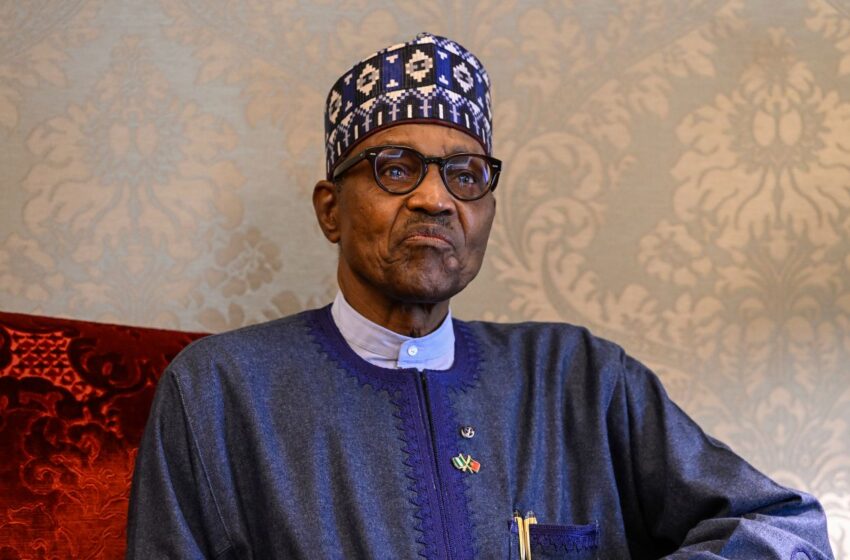Buhari dies in London… here’s all you need to know
- Top Stories
crispng
- July 13, 2025
- 678

Former Nigerian president Muhammadu Buhari, during a meeting with Portuguese President Marcelo Rebelo de Sousa in Belem Presidential Palace in Lisbon, Portugal at the beginning of his state visit to the country on June 30, 2022. Horacio Villalobos/Corbis/Getty Images
Nigeria is in mourning following the death of former President Muhammadu Buhari, a towering figure in the nation’s political landscape for over four decades. The 82-year-old statesman passed away on July 13, 2025, in London, where he had been receiving medical care for an undisclosed illness.
Buhari, who first came to power as a military ruler in 1983 before returning as a democratically elected president in 2015, leaves behind a complex legacy defined by anti-corruption efforts, economic challenges, and a polarising leadership style. His death marks the end of an era and has sparked a wave of national reflection and tributes.
Who Was Muhammadu Buhari?
Muhammadu Buhari served twice as Nigeria’s leader: first as military head of state following a 1983 coup and later as an elected civilian president from 2015 to 2023. Under his leadership, he launched an “anti-corruption broom” campaign and battled militant groups such as Boko Haram, earning him a reputation of stern leadership and determination. His presidency was marked by controversy—frequent medical trips abroad, economic downturn, and accusations of selective anti-corruption efforts—but he remained a dominant political figure until passing the mantle to Bola Tinubu in 2023.
When, Where, and How Did He Die?
Buhari died on July 13, 2025, in London, where he had been receiving treatment for a prolonged illness. His death was confirmed in the afternoon by his official spokesperson, Garba Shehu, and has been mourned nationwide. No specific cause of death was announced, only that it followed a sustained illness .
INNA LILLAHI WA INNA ILAIHIRRAJIUUN.
The family of the former president has announced the passing on of the former president, Muhammadu Buhari, this afternoon in a clinic in London.
May Allah accept him in Aljannatul Firdaus, Amin. pic.twitter.com/Dv0IfgzWAc— Garba Shehu (@GarShehu) July 13, 2025
What Has Been the Nigerian Government’s Response?
President Bola Tinubu ordered a period of national mourning: all flags are to be flown at half-staff, and Vice President Kashim Shettima has been sent to London to oversee Buhari’s return. Tributes have poured in across the country for a man seen as steadfast in his anti-corruption commitments and his controversial handling of national security issues .
How Will Buhari Be Remembered?
Buhari’s legacy is complex: a mix of harsh discipline, unfulfilled promises, and unwavering resolve. Regarded as incorruptible by some, critics highlight rising insecurity and persistent poverty during his tenure. His legacy will likely be weighed between his symbolic fight against corruption and the unmet expectations of economic and social reform.
READ ALSO
The biggest projects under President Buhari that failed
What Comes Next?
Vice President Shettima is expected to oversee Buhari’s return to Nigeria and subsequent official funeral rites. National mourning protocols will be observed ahead of eventual burial. Political speculation is rising around how Buhari’s death may impact the ruling All Progressives Congress (APC) and the broader political landscape as present leaders pay their respects.
Analysis: What Buhari’s Death Means for Nigerian Politics and the 2027 Election
Though Muhammadu Buhari left office in 2023, his shadow continued to loom large over Nigeria’s power structure—especially within the APC and northern political blocs. His death marks the end of a political era and could trigger a reshuffling of influence in northern Nigeria, where he held unmatched grassroots loyalty.
With the 2027 general election approaching, Buhari’s absence may:
-
Weaken the northern consolidation that helped the APC win power.
-
Intensify zoning debates, especially if the north seeks to reclaim the presidency after Bola Tinubu’s tenure.
-
Spark power realignment among northern governors, traditional rulers, and religious blocs who once leaned on Buhari’s symbolic capital.
-
Create space for emerging northern leaders like Nasir El-Rufai, Rabiu Kwankwaso, or Kashim Shettima to assert more influence.
For the opposition, his absence removes a unifying symbol of APC continuity, potentially making it easier to critique the party’s record without invoking Buhari’s personal popularity in the north.
In short, Buhari’s passing may reignite regional tensions and factional jostling within the ruling party while presenting a fresh political opening for those eyeing 2027.

